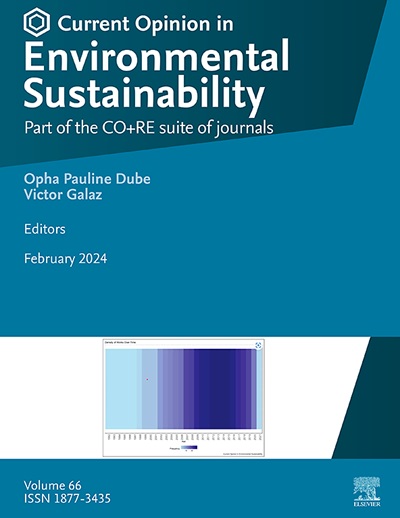Pathways to a blue economy
IF 6.3
2区 环境科学与生态学
Q1 ENVIRONMENTAL SCIENCES
Current Opinion in Environmental Sustainability
Pub Date : 2025-10-01
DOI:10.1016/j.cosust.2025.101570
引用次数: 0
Abstract
Charting a path to a blue economy is imperative to avoid major climate change and irreversible damage to marine ecosystems, the wider environment and society. The blue-ness of the future ocean economy and the associated health of the oceans and our planet will be determined by the pathways chosen, the strategies developed and decisions made now. Here, through bibliometric analysis, multidisciplinary literature review and data synthesis, we present prospective pathways that define different future ocean economies. The intention is to provoke interdisciplinary debate, exchange of ideas, further research and action towards shifting the ocean economy from grey to blue. We show that a business-as-usual pathway that sustains the current grey ocean economy will lead to accelerated violation of planetary boundaries and ultimately destruction of the natural capital on which the ocean economy and humanity depend; that a probable pathway, based on optimistic trends, which attempt to meet the conflicting increasing demand of populations globally and need to curb carbon emissions, is insufficient to meet decarbonisation and broader sustainability targets; and that a pathway to transition to a blue economy requires ambitious proactive strategies and immediate decisions, based on principles that aspire to the collaborative, fair and sustainable use of the ocean.
通往蓝色经济的道路
为避免重大气候变化和对海洋生态系统、更广泛的环境和社会造成不可逆转的破坏,必须规划一条通往蓝色经济的道路。未来海洋经济的蔚蓝程度以及与之相关的海洋和地球的健康状况将取决于选择的道路、制定的战略和现在作出的决定。通过文献计量分析、多学科文献综述和数据综合,我们提出了未来不同海洋经济的前景路径。其目的是激发跨学科的辩论、思想交流、进一步的研究和行动,以将海洋经济从灰色转向蓝色。我们表明,维持当前灰色海洋经济的一切照旧的道路将导致加速对地球边界的侵犯,并最终破坏海洋经济和人类所依赖的自然资本;基于乐观趋势的可能路径——试图满足全球人口不断增长的相互矛盾的需求和遏制碳排放的需要——不足以实现脱碳和更广泛的可持续性目标;向蓝色经济过渡的道路需要雄心勃勃、积极主动的战略和立即作出的决定,这些战略和决定要基于渴望合作、公平和可持续利用海洋的原则。
本文章由计算机程序翻译,如有差异,请以英文原文为准。
求助全文
约1分钟内获得全文
求助全文
来源期刊

Current Opinion in Environmental Sustainability
ENVIRONMENTAL SCIENCES-ENVIRONMENTAL SCIENCES
CiteScore
13.80
自引率
2.80%
发文量
52
审稿时长
6-12 weeks
期刊介绍:
"Current Opinion in Environmental Sustainability (COSUST)" is a distinguished journal within Elsevier's esteemed scientific publishing portfolio, known for its dedication to high-quality, reproducible research. Launched in 2010, COSUST is a part of the Current Opinion and Research (CO+RE) suite, which is recognized for its editorial excellence and global impact. The journal specializes in peer-reviewed, concise, and timely short reviews that provide a synthesis of recent literature, emerging topics, innovations, and perspectives in the field of environmental sustainability.
 求助内容:
求助内容: 应助结果提醒方式:
应助结果提醒方式:


